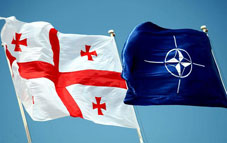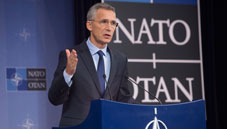
NATO Secretary-General says Alliance door remains open for Georgia
By Khatia Bzhalava
Tuesday, March 23
NATO Secretary-General Jens Stoltenberg stated at a virtual press conference ahead of the NATO Foreign Ministers meeting in Brussels that the Alliance door remains open, and
Russia has no right to block Georgia from joining NATO. Stoltenberg stressed that NATO supports Georgia’s aspirations to join the Alliance.
NATO Secretary-General mentioned at the press conference that he had recently met with Georgian Prime Minister Irakli Garibashvili and conveyed the same message to him.
“NATO supports Georgia's efforts to join NATO. We support Georgia in different ways, including by supporting reforms, strengthening democratic institutions and we will continue to do so,” noted Stoltenberg.
NATO Sec-Gen announced that he would meet Secretary Blinken at the NATO Foreign Ministerial meeting, where one of the things discussed will be Russia. In this regard, Stoltenberg stressed the fact that Russia has often expressed that they have some kind of ‘right to try to deny countries to join NATO,’ the latest example of which is Bosnia and Herzegovina. He underscored that it is only up to NATO and the aspirant country to decide whether a country becomes a member of NATO or not. According to Stoltenberg, It is a sovereign right of every nation, including Georgia, Ukraine, and Bosnia and Herzegovina, to choose their path, and no one ‘from the outside’ is eligible to interfere in that process.
According to NATO Secretary-General, Russia is violating international law and is acting aggressively towards its neighbors, Georgia and Ukraine. Stoltenberg stressed that the relationship between NATO and Russia has been difficult for some time now, which is a result of "Russia's behavior, violating international law, using military force against neighbors – Georgia and Ukraine." He emphasized that Russia and the Russian president are responsible for the aggressive actions against NATO-allied member states through cyber interference in NATO’s domestic political processes.


